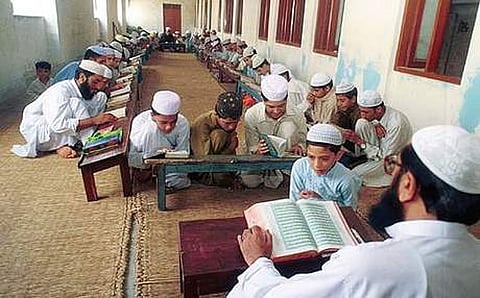

DEHRADUN: Uttarakhand is poised to become the second state, after Assam, to dissolve its dedicated Madrasa Board following the Governor's assent to the Minority Education Bill 2025.
The move has ignited a sharp political controversy, with the opposition Congress strongly condemning the decision, even as the state's Madrasa Board Chairman hails it as a crucial step for community development.
The passage of the new legislation means that madrasas will now fall under the purview of a unified educational framework, a move the ruling BJP claims will enhance transparency and quality in education. Uttarakhand Madrasa Board Chairman Mufti Shamoon Qasmi defended the reform, stating that it will integrate madrasa students into the mainstream education system.
Speaking to TNIE, Qasmi said, "This new law ensures that students passing out from madrasas will receive an officially recognised degree."
He added, "All madrasas will now operate under a single legal body, securing their much-needed recognition." Qasmi strongly refuted criticisms from the opposition, asserting that the religious education imparted in these institutions will remain unaffected.
He accused the Congress of politicising the issue: "For the last 70 years, Congress kept Muslims away from education through vote-bank politics. Now, the BJP government is providing every Muslim student a chance to join the mainstream of education."
He noted that currently, only about four percent of students study in madrasas, and the new law makes no provision to stop religious instruction.
However, the Congress party has reacted with anger, alleging that the government is systematically targeting minority institutions. Najma Khan, State Vice President of Uttarakhand Congress, announced plans to meet with prominent Muslim leaders, including the Shahr Qazi, to discuss the implications. Khan expressed deep apprehension: "The government is constantly bringing laws to suppress Muslims. First, they targeted the Waqf Board, and now they are determined to finish the Madrasa Board."
She warned that removing religious instruction could jeopardise the cultural identity of future generations.
"If this continues, the very religious existence of our community will be questioned," Khan remarked, condemning the legislation as biased against the principle of 'Sarva Dharma Sambhava' (tolerance of all religions). Chief Minister Pushkar Singh Dhami emphasised the bill’s objective: "With the Governor’s approval, the Minority Education Bill 2025 paves the way for creating an authority to recognize minority educational institutions."
He concluded, "This law will certainly help make the education system in the state more transparent, accountable, and quality-oriented."
The story is reported by Narendra Sethi for The New Indian Express
